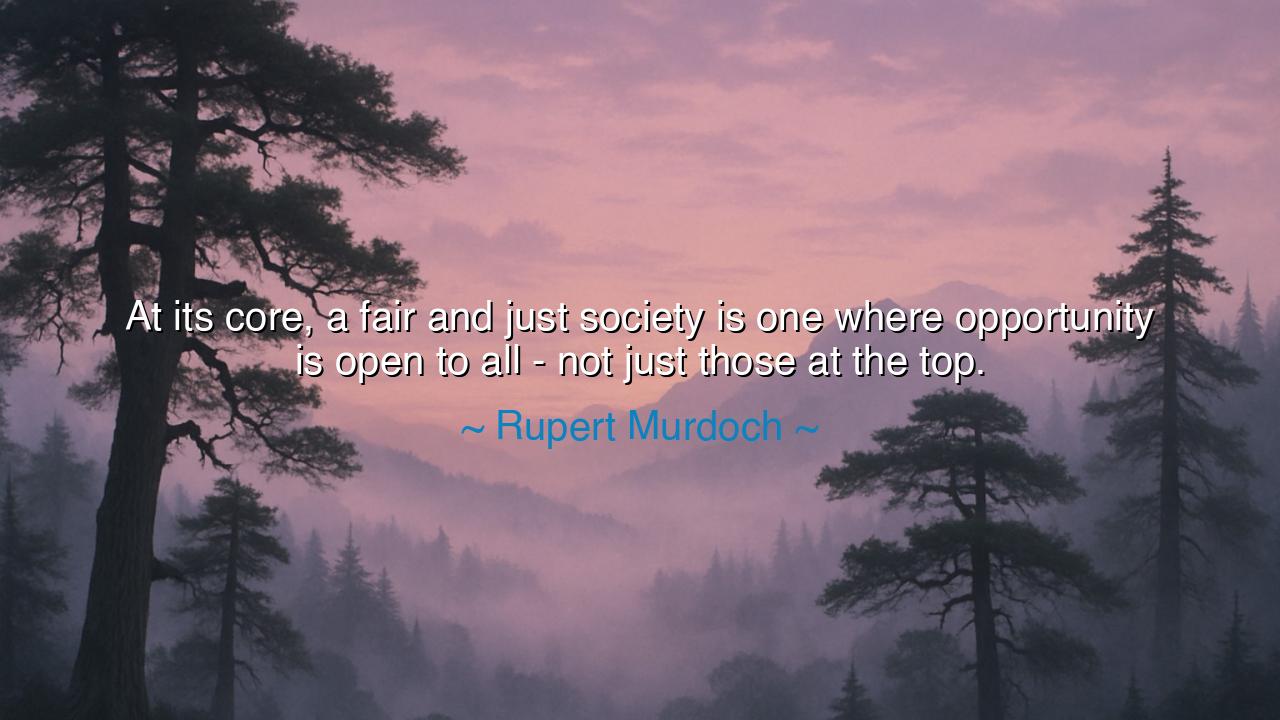
At its core, a fair and just society is one where opportunity is
At its core, a fair and just society is one where opportunity is open to all - not just those at the top.






Hear the words of Rupert Murdoch, spoken like a truth carved upon the walls of time: “At its core, a fair and just society is one where opportunity is open to all – not just those at the top.” This is not the whisper of comfort, but the voice of justice. For what is a society if not the weaving together of many lives into one great fabric? And what becomes of that fabric if only the richest threads are preserved while the humbler ones are ignored? It frays, it weakens, it tears apart. Thus Murdoch reminds us that the measure of fairness is not how high the elite may climb, but whether opportunity reaches the hands of all, from the lowliest laborer to the loftiest ruler.
The origin of this saying lies in the eternal struggle between privilege and equality. Murdoch, himself a man of immense influence, spoke to the truth that even great wealth and power cannot secure the future of civilization if the masses are denied their chance to rise. A just society is not built by locking doors but by opening them, not by hoarding knowledge but by spreading it, not by exalting a few but by uplifting the many. Without this openness, envy grows, unrest brews, and nations crumble beneath the weight of their own inequality.
The ancients themselves bore witness to this truth. Recall the Roman Republic, whose founding principle was that no single king should rule, and that citizens must have a share in governance. In its early years, Rome grew strong because even the common man had a voice through the assemblies. But when corruption and privilege hardened, when senators cared only for themselves and the poor were silenced, the Republic collapsed, giving way to empire and tyranny. This lesson thunders across time: when opportunity belongs only to those “at the top,” even the greatest of nations may fall.
Consider also the story of Abraham Lincoln, born in a humble log cabin, with little schooling and no inheritance of wealth. In a land where opportunity was open, he rose through perseverance and wisdom to lead his nation. And in his leadership, he extended opportunity further, proclaiming the emancipation of slaves and striving toward a truer equality. His life was proof of Murdoch’s words: that greatness lies not in privilege preserved but in doors flung open, allowing the humblest to become the mightiest.
The meaning of this quote is therefore clear: justice is not charity, but balance. It is not enough that some prosper while others starve. A society that claims to be fair must ensure that education, work, and advancement are not the guarded treasures of the elite, but the common inheritance of all. To deny opportunity to the many is to poison the well of peace; to share it is to make the entire nation strong.
What lesson then shall we take into our hearts? That each of us must labor to widen the circle of inclusion. If we are leaders, we must raise others up. If we are teachers, we must open doors of knowledge to every child, not only the privileged. If we are citizens, we must demand that laws and institutions guard the rights of the least as well as the greatest. For fairness is not a dream, but a discipline, practiced daily in the choices we make.
Therefore, children of the future, remember this teaching: a just society is a rising tide, lifting every vessel, great and small. If you guard opportunity only for yourself, it will decay; if you open it to all, it will multiply. Let your communities be judged not by how the wealthy live, but by whether the poor can hope, strive, and rise. For in the measure of opportunity shared, you will find the measure of justice, and in the measure of justice, the endurance of civilization itself.






AAdministratorAdministrator
Welcome, honored guests. Please leave a comment, we will respond soon